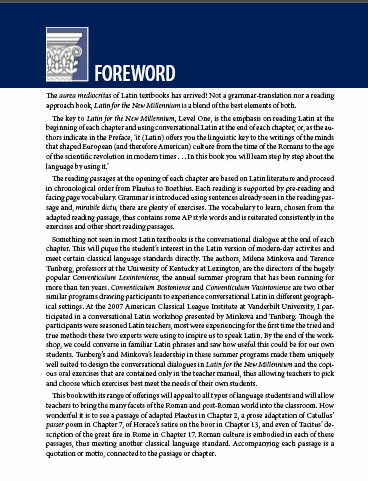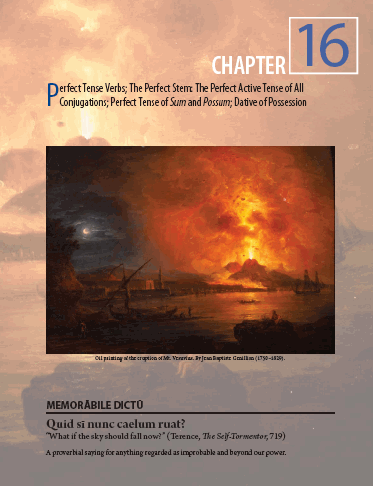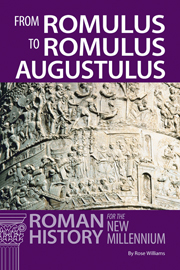Latin for the New Millenium
Level 1, 2nd Edition Samples
 |
Level 1 Textbook: Table of ContentsSee what's included in the LNM Level 1 Student Textbook's 21 chapters, seven review units, grammar, readings, as well as appendices, glossary, and maps.
Read More |
 |
Level 1 Textbook: ForewordRead Boston Latin Academy teacher Paul Properzio's two-page essay that distills the essence of what makes LNM both special and practical.
Read More |
 |
Level 1 Textbook: Chapters 1–3Explore LNM's Unit 1, Chapters 1–3, in its entirety. Get a feel for Minkova and Tunberg's fusion approach to teaching introductory Latin by immersing yourself in the text.
Read More |
 |
Level 1 Textbook: Chapter 7Read Chapter 7, the midpoint of Unit 2, and see how it addresses third declension masculine and feminine nouns. Based on its significant presence in Latin writings, the authors introduce the indirect statement, accusative and infinitive construction, at this point. Read a Catullus elegy, preview vocabulary and exercises, and participate in two Latin dialogues, one ancient and one modern.
Read More |
 |
Level 1 Textbook: Chapter 16Chapter 16 addresses perfect tense verbs, the perfect stem and perfect active tense for all conjugations, the perfect tense of sum and possum, and the dative of possession. Read a passage from Pliny the Younger, preview vocabulary and exercises, and participate in two Latin dialogues, one ancient and one modern.
Read More |
 |
Level 1 Textbook: Review Unit 1Learn how LNM's review units are organized. Explore the "Vocabulary to Know," review exercises, and myth-related Latin passage. Read the special culture essays that flow from the readings in the three chapters: "Considering the Classical Gods: Mars, Jupiter, and Juno," "Connecting with the Ancient World: Slavery", as well as the scholarly essay, "Exploring Roman Comedy," by Professor Emeritus William S. Anderson of the University of California, Berkeley.
Read More |
 |
Level 1 Textbook: Teacher's Manual, Front MatterThe first 40 pages of the Teacher's Manual for Level 1 includes: a summary of chapter, course, and review components; resource list; contents, foreword, preface, author and consultants list, and introduction from the student textbook; teacher tips and space for notes.
Read More |
 |
Level 1 Textbook: Teacher's Manual, Chapter 1The Teacher's Manual includes teacher resources and answer keys. Check out Chapter 1 with its teaching tips and background information, correlations, answers to the exercises, six sets of optional aural-oral exercises, and English derivatives material.
Read More |
 |
Level 1 Workbook: Chapter 1Review seven (including one on English derivatives) sets of additional exercises plus a set of reading comprehension questions that support Level 1, Chapter 1.
Read More |
 |
Level 1 Workbook: Teacher's Manual, Chapter 1This PDF contains all of the Student Workbook questions for Level 1, Chapter 1, plus the answers.
Read More |
 |
Level 1 Enrichment Text: MythologyThe Original Dysfunctional Family
A very accessible introduction to classical mythology, The Original Dysfunctional Family: Basic Classical Mythology for the New Millennium presents the key stories of the twelve Olympians as well as those of the two gods associated with the fruits of the harvest, Demeter and Dionysus. The Greek version of each Olympian is presented first followed by the Roman adaptation. Chock-full of information, this book provides a sound foundation for the beginning student's further studies in culture, literature, and history. The general reader will find Williams's style engaging. Read More |
 |
Level 1 Enrichment Text: HistoryFrom Romulus to Romulus Augustulus
Readers will delight in the fascinating stories of Rome—the quirky, the gory, and the momentous. This book will serve as the perfect companion for the student beginning to study Latin or as an accessible introduction to Roman history for the general reader. Recognizing the symbiotic relationship between literature and the period in which it was produced, From Romulus to Romulus Augustulus: Roman History for the New Millennium provides a comprehensive overview of Roman history and Latin literature. Read More |

